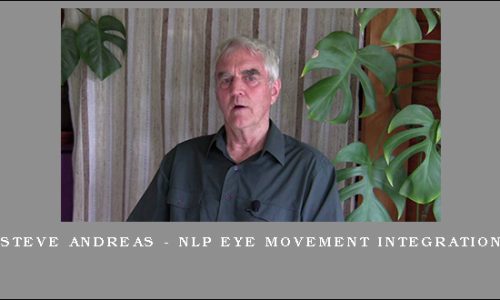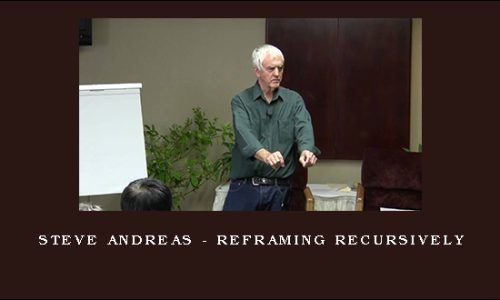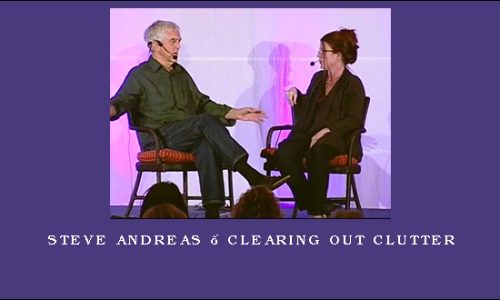
Steve Andreas – Building Self-Concept

Download Steve Andreas – Building Self-Concept on Avaicourse.com
This course is available immediately. Please contact us at avaicourse17@gmail.com with the best service for more detailed advice.
Description:
We have been exploring the impact and the interaction of both process and content variables in making a quality of your self-concept durable and responsive to feedback. We have also explored the importance of integrating counterexamples, and how to transform counterexamples into examples. With what you have learned, you could ask someone about any important quality of their self-concept, ask them questions to find out how they already do it, and then teach them a variety of additional skills so that their self-concept functions much better than it already does. Making this kind of change will reverberate throughout their life, affecting many specific behaviors and responses.
Now it’s time to demonstrate how to use all this information to do something even more useful and generative, namely to create a whole new positive quality of self-concept when a person has no representation of this quality.
When someone thinks of themselves as having a certain quality, such as being lovable, that indicates that they have a positive self-concept with regard to that quality. Since they have this basis for inner knowing, they don’t need others to tell them, and when others express their recognition of it, they can fully appreciate the additional confirmation.
When someone says, “I’m unlovable,” that indicates that they think of themselves as not lovable, a negative self-concept with regard to that quality, something that we will explore in considerable detail later. If we were to try to build a positive self-concept for that quality, it would be very difficult, because this would conflict with the negative self-concept that is already there. And if we did succeed in building a new positive quality, that would create ambivalence and uncertainty. Some people are already ambivalent in this way. Sometimes they feel lovable, sometimes they don’t, and often they are just unsure.
When someone says, “I don’t think of myself as lovable,” we need more information to know what their inner experience is. They could be saying that they have a negative self-concept. Or they could mean what the words literally say–simply that they don’t have a positive self-concept (or a negative one) with regard to that quality. They presumably know what the word “lovable” means, but they have not assembled experiences (either positive or negative) that provide any information about whether they are lovable or not. For convenience I will call this absence of a database a “null set.”
Since they don’t know if they are lovable or not, they typically often ask others for confirmation. But even when they get this support from others, it doesn’t last very long, because they don’t have a way to store this information. Hearing the external confirmation is like receiving water in a sieve–it goes right through and disappears. So they are likely to ask again soon, and are often described by others as “insecure,” “needy,” or “dependent.”
In this case it is appropriate to simply assemble experiences into a desired quality of positive self-concept, a method that was first described years ago. (See the book, Heart of the Mind, Ch. 3). Since often someone already has an ambiguous or negative representation of the quality, the opportunities for using this pattern are somewhat limited. However, for teaching purposes it is useful to start with the simplest case, in which there is no negation or ambivalence to deal with, and we can simply use what we have learned to build a new quality of self-concept. Soon we will go on to learn how to transform an ambivalent or negative quality of self-concept into a positive one.
The verbatim transcript that follows is of a demonstration from an NLP Master Practitioner Training conducted in 1992, and is available on DVD (Building Self Concept, Steve Andreas). At that time I was still in the process of modeling self-concept, so I knew much less than you do now. I had made a brief introductory presentation much like the foregoing, and when I asked for a volunteer for a demonstration of this process, Peter raised his hand.
Demonstration
And what is it that you’d like to–? (build)
Peter: Well, “lovable” really hit a chord.
OK, you don’t think of yourself as lovable.
Peter: Not particularly.
think of you as lovable, so come on up. (Peter comes to the front of the room.) OK, now when I said that, what did you do inside?
Peter: (shaking his head and shrugging) I sort of went, “Nope.”
Now, if you go “Nope”–give me some more. (to the group) See, I’m testing to make sure it’s not one of these (negatives).
Peter: Well, it sort of hits a– I get a sense that it hits a blank.
“A blank.” OK. That sounds good. Because if it’s one of these (null sets), then it’s like there’s just nothing there. It’s not that there is a negation. And as I experience you, I don’t– I wouldn’t think that you
Internet Marketing Course
Digital marketing is the component of marketing that utilizes internet and online based digital technologies such as desktop computers,
mobile phones and other digital media and platforms to promote products and services. Its development during the 1990s and 2000s,
changed the way brands and businesses use technology for marketing. As digital platforms became increasingly incorporated into marketing plans and everyday life,
and as people increasingly use digital devices instead of visiting physical shops, digital marketing campaigns have become prevalent,
employing combinations of search engine optimization (SEO), search engine marketing (SEM), content marketing, influencer marketing, content automation,
campaign marketing, data-driven marketing, e-commerce marketing, social media marketing, social media optimization, e-mail direct marketing, display advertising,
e–books, and optical disks and games have become commonplace. Digital marketing extends to non-Internet channels that provide digital media, such as television,
mobile phones (SMS and MMS), callback, and on-hold mobile ring tones. The extension to non-Internet channels differentiates digital marketing from online marketing.
More Course: INTERNET MARKETING
Outstanding Course:Stacey Mayo – Sharpen Your Sentelligence
Course Features
- Lectures 0
- Quizzes 0
- Duration 50 hours
- Skill level All levels
- Language English
- Students 0
- Assessments Yes





